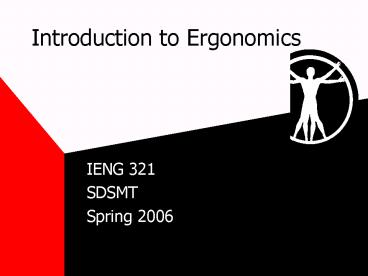Introduction to Ergonomics - PowerPoint PPT Presentation
Title:
Introduction to Ergonomics
Description:
Sports. jogging, softball, rock climbing, golf, racquet sports, etc. Miscellaneous ... Nutrition. obesity. oral contraceptives. posture. pregnancy. prior ... – PowerPoint PPT presentation
Number of Views:90
Avg rating:3.0/5.0
Title: Introduction to Ergonomics
1
Introduction to Ergonomics
- IENG 321
- SDSMT
- Spring 2006
2
Course Introduction
- Course Website
- http//www.hpcnet.org/sdsmt/directory/personnel/ck
erk - Syllabus
- Minor in Occupational Safety
- http//webpages.sdsmt.edu/ckerk/osminor.htm
- Course Content Matrix
3
What is Ergonomics?
- Laws of Work
- the science and art of fitting the job to the
employee to - minimize injuries
- improve productivity quality
- The Dual Goals
4
Ergo concepts come from . . .
- Engineering concepts
- physics
- psychology
- anthropometry
- anatomy
- physiology
- kinesiology
5
Ergo requires skills in . . .
- Teamwork
- problem solving
- innovative thinking
- communications
- economic accountability
- desire to help people
6
Why Address Ergonomics?
- Regulatory reasons
- Humanitarian reasons
- Good business practice
7
Cost Categories Forgotten?
- Lost productivity
- medical plan
- absenteeism
- reduced quality / service
- employee turnover
- training
8
Why?
- Cases involving 31 or more days away from work
accounted for 44.5 of CTS cases and 22 of all
nonfatal injuries and illnesses (2003 BLS) - A single CTD could reach 50,000
- But, we dont need to justify based on claim
costs - Because ergonomics is good business!
9
Severity of CTS Cases with all nonfatal injury
and illness cases when measured by days away from
work in 2001. (BLS 2003)
10
Magnitude and Trend Numbers and types of
occupational illness cases between 1972 and 2001.
(BLS 2002)
11
Nature of the Injury or Illness Nonfatal
injuries and illnesses distributed by nature of
injury or illness in 2001. (BLS 2003)
12
Which injuries and illnesses accounted for the
most severe work loss in 2001. (BLS 2003)
13
How nonfatal injuries and illnesses were
distributed by body part affected in 2001. (BLS
2003)
14
Cost Accounting
- Account for safety injury costs by department
or unit - Coordinate Workers Compensation costs and
Medical costs
15
The Risk Factor Model
Lack of Rest
Work/Rest Ratio
Shift Length
Environment
Sustained
Repetition
Occupational
Vibration
Non-Occupational
Temperature
Posture
Physical Temporal Risk Factors
Force
Personal
Psychosocial
Compounding Risk Factors
16
Physical Temporal Risk Factors
- Force
- Posture
- Temperature
- Vibration
- Repetitions
- Sustained
- Shift Length
- Work / Rest Ratio
- Lack of Rest
17
Vibration
- Identify sources
- Eliminate or isolate if possible
- Dampening
- better tool design
- handle coatings
- dampening gloves
18
Thermal Considerations
- Avoid cold exposure to extremities
- especially fingers
- Consider special gloves
- Consider localized heating
19
Non-Occupational Activities
- Hobbies
- gardening, knitting, sewing, musical instruments,
etc. - Sports
- jogging, softball, rock climbing, golf, racquet
sports, etc. - Miscellaneous
- household chores, carrying children, driving cars
- Sleep
20
(No Transcript)
21
Personal Risk Factors
- Aerobic capacity
- age
- alcoholism
- body build
- diabetes
- flexibility
- gender
- gout
- hypertension
- medical history
- menopause
- Nutrition
- obesity
- oral contraceptives
- posture
- pregnancy
- prior history of injury
- renal disease
- rheumatoid arthritis
- smoking
- stature
- strength
22
(No Transcript)
23
Psychosocial Risk Factors
- Organizational climate culture
- Job attitude job satisfaction
- Personality traits
- Personal problems
- marital problems
- death of loved ones
- financial problems
24
(No Transcript)

